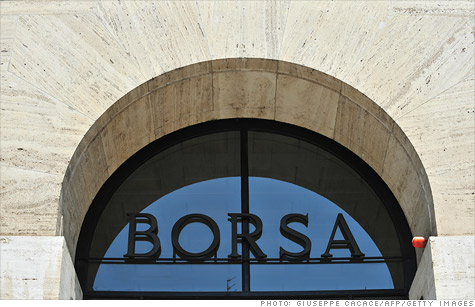Search News

The Milan stock exchange was roiled this week amid fears that Italy could be the next European economy to succumb to the debt crisis.
NEW YORK (CNNMoney) -- The debt crisis in Europe is knocking on Italy's door, but American banks still appear to be well insulated from the dreaded contagion.
Italy has been lumped in with Greece and other troubled European economies because it has a heavy debt load and dim economic prospects. But the nation is not in immediate danger of default.
Ratings agency Fitch said Wednesday that the budget proposed by the Italian government this week should enable it to maintain an investment grade rating and a stable credit outlook.
That means the relatively small direct exposure U.S. banks have to Italian government bonds is currently not a major threat. At the same time, risk managers are well aware of Italy's woes, and many banks have hedged their bets on the nation.
"The direct exposure is really not a concern right now," said Jim Sinegal, banking analyst at Morningstar. He said the main U.S. banks, including JPMorgan Chase (JPM, Fortune 500), Citigroup (C, Fortune 500) and Bank of America (BAC, Fortune 500), have disclosed direct exposure to Italy equal to less than 2% of total assets.
But Italy is the third largest economy in Europe and has one of the largest bond markets on the continent. That means U.S. banks probably have some indirect exposure to the nation.
"There's some exposure just because of the size of the Italian bond market," said Brad Hintz, an analyst at Sanford Bernstein. "All the major players in terms of fixed income are market makers in Italian bonds."
Indeed, Morgan Stanley (MS, Fortune 500) and JPMorgan are among the Bank of Italy's primary dealers of government securities.
Overall, banks around the world hold a total of $262 billion in Italian debt, according to research from Collins Stewart. That's more than the sovereign claims of banks on Greece, Ireland, Portugal and Spain combined. Investors will find out more about the health of Europe's banks later Friday after the latest stress test results are released by regulators.
While European banks are the largest holders of Italian bonds, U.S. banks and private sector investors have a combined $36.8 billion worth of exposure to the nation, according to Collins Stewart.
Matthew Czepliewicz, an analyst at Collins Stewart, cautioned that the figures "overstate" the economic impact of the exposure because they do not take into account any hedges.
Another potential concern is the exposure U.S. banks might have to Italy through credit default swaps, complex derivatives that investors use as insurance policies on bonds and other assets.
The market for credit default swaps is notoriously opaque. But based on rough estimates from Collins Stewart, U.S. banks have $22.7 billion in Italian credit default swap exposure.
By comparison, banks in France, Germany and the United Kingdom have a combined $11 billion worth of credit default swap exposure to Italy.
But analysts say credit default swaps on Italy are less likely to blow up the way mortgage-backed swaps did in 2008.
The difference is that Italy's problems have been well known for over a year, and banks appear to be much more aware of the risks than they were when the housing market began to unravel. They aren't ignoring those risks either.
And the market for Italian credit default swaps remains liquid, which was not the case three years ago, notes Hintz.
"We've seen this one coming," he said. "You can still get out of exposure to Italy."
While few expect Italy to default, the outlook for the nation is far from certain and investors remain wary.
Richard Bove, a bank analyst at Rochdale Securities in Florida, said a default by Italy, while unlikely, would create "significant problems" for Italian businesses and individuals that could spread across the financial system and hit U.S. banks.
"The exposure to Italy is substantial if you look beyond the sovereign debt situation," he said. "It would be impossible for American banks to avoid being hurt if Italy were to default." ![]()
| Overnight Avg Rate | Latest | Change | Last Week |
|---|---|---|---|
| 30 yr fixed | 3.80% | 3.88% | |
| 15 yr fixed | 3.20% | 3.23% | |
| 5/1 ARM | 3.84% | 3.88% | |
| 30 yr refi | 3.82% | 3.93% | |
| 15 yr refi | 3.20% | 3.23% |
Today's featured rates: